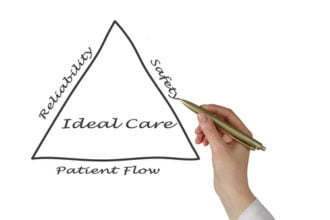Last month, we discussed the importance of imagination in the context of big and revolutionary ideas and how we need those ideas to truly innovate healthcare in a transformative way. The reality, however, is that coming up with those big, imaginative concepts is much easier said than done, and they are a rarity.
Of course, we should always want those big quantum ideas and solutions, but we should not forget that…
Last month, we discussed the importance of imagination in the context of big and revolutionary ideas and how we need those ideas to truly innovate healthcare in a transformative way. The reality, however, is that coming up with those big, imaginative concepts is much easier said than done, and they are a rarity.
Of course, we should always want those big quantum ideas and solutions, but we should not forget that…
A lot of innovation in healthcare is incremental and progressive—and there is absolutely nothing wrong with baby steps.
 Often, new drugs, devices or medical procedures are only marginally better than what is already available. Critics are very quick at calling these out as wasteful, expensive and unnecessary. When looking at a single, small evolutionary step very narrowly, they may have a good point. After all, going from a twice-a-day drug to a once-a-day drug with the same clinical profile (i.e., similar benefits and side effects) does seem like no change at all or little at best.
Often, new drugs, devices or medical procedures are only marginally better than what is already available. Critics are very quick at calling these out as wasteful, expensive and unnecessary. When looking at a single, small evolutionary step very narrowly, they may have a good point. After all, going from a twice-a-day drug to a once-a-day drug with the same clinical profile (i.e., similar benefits and side effects) does seem like no change at all or little at best.
However, from time to time, we need to step back and look at bigger timeframes in which multiple relatively small, sequential innovations have taken place. Let’s pick on hypertension as an example. In the last few decades, we have seen the discovery, development and introduction of dozens of products in many classes and subclasses: diuretics, beta-blockers, calcium channel blockers, ACE inhibitors, angiotensin receptor blockers, renin inhibitors and more. Some have been better than others at their core job, i.e. to lower high blood pressure, or have offered particular benefits to specific patient populations (e.g., comorbidities, such as people with heart failure or renal impairment), but others have been marginally better, offering benefits like less frequent dosage or trading one bothersome side effect for another.
However, if we take a step back and look at hypertension management since the 1950s and see the point-to-point difference, the overall innovation has been dramatic. Who would want to go back to the use of reserpine, with its severe side effects, including its association with depression leading to suicide?
It would have been wonderful if, magically, science could have gone from reserpine to angiotensin receptor blockers, in one imaginative and disruptive giant step.
But this is an impossible wish. Basic science, the understanding of disease, the discovery of mechanisms and receptors and the advent of new research tools and methods all took a long time and a lot of blood, sweat and tears to evolve in labs across the world. We simply had to go through the journey, and, fortunately, the journey is not over because we need even better agents.
We see a similar journey in the world of cholesterol management. Going way back to disgusting powders that felt and tasted like sand to somewhat effective agents with many side effects to the statins that transformed cardiovascular risk management in dramatic ways, we’re benefiting from this incremental evolution. The new kids on the block are the PCSK-9 inhibitors with a lot of promise in lowering LDL cholesterol dramatically and also having positive effects on hospitalizations and mortality. Data and findings on these products are being presented at major meetings around the world, and the first products have been filed for regulatory approval. If successful, these should help continue the decline of devastating outcomes of cardiovascular disease.
We’ve come a long way indeed!

_5_1.jpg)







